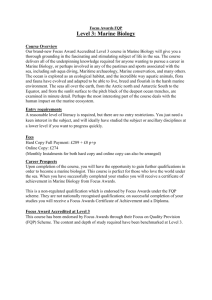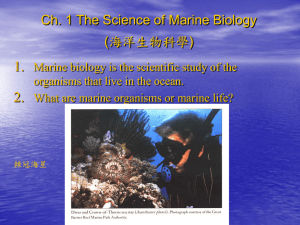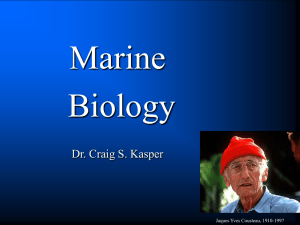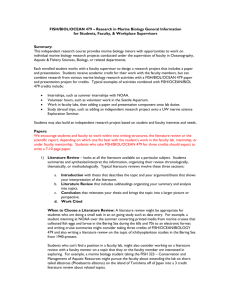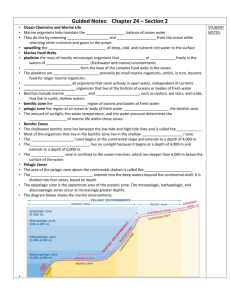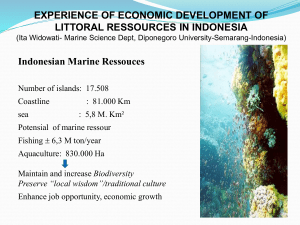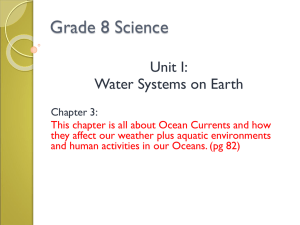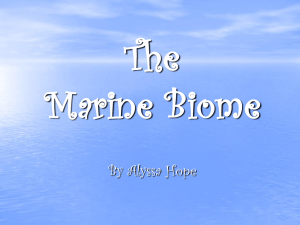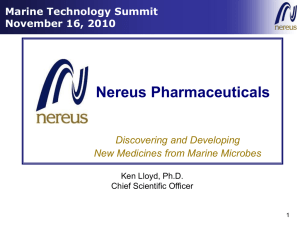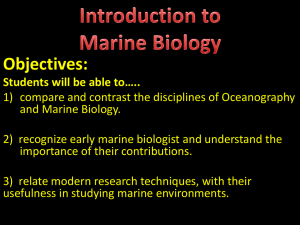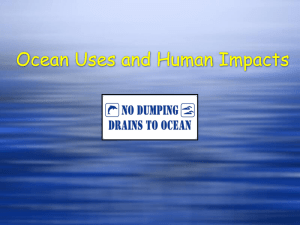Intro to Marine Science/Scientific Method
advertisement
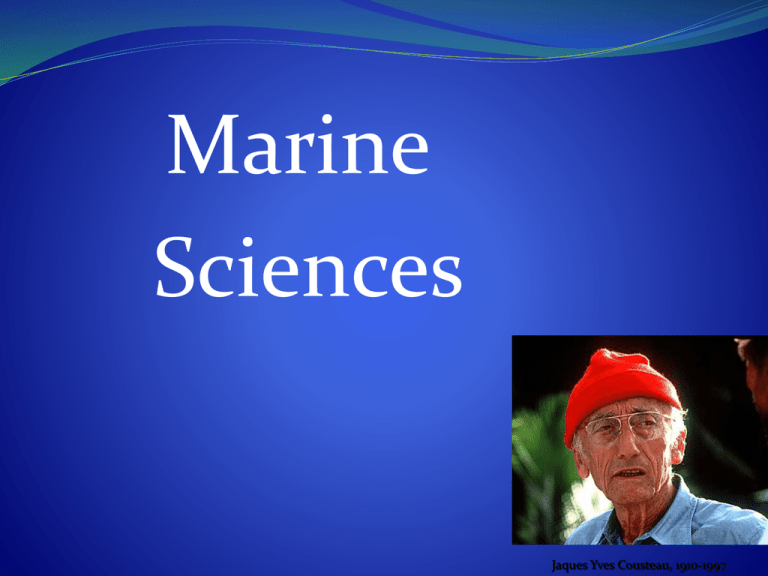
Marine Sciences Jaques Yves Cousteau, 1910-1997 What is Marine Science Study of living organisms and their relationship to the chemical, physical and geological nature of the ocean Marine Biology • Study of plants, animals, and other organisms that live in the ocean Oceanography • Study of tides, waves, currents, as well as geologic history and characteristics of the ocean Why Care?!? Marine life provides us with food, medicine, and raw materials, in addition to offering recreation and supporting tourism Why Care!?! Marine life helps determine the nature of our planet by producing much of the oxygen we breathe Indirectly helps regulate Earth’s climate Why Care?!?! Not all interactions are positive… Marine life may harm humans: Disease Attacks Killing or injuring other marine organisms we rely upon Erode piers, walls, other structures The reverse is also true…. Portuguese Man-O-War Commercial Diver Repairing Damaged Structure http://www.weather.com/news/science/environ ment/20-cities-most-lose-rising-sea-levels20130822?pageno=21 Marine Biologists? It’s really basic science applied to the sea, not the sea applied to science. Nearly ALL disciplines are represented in Marine Science (Biology) Archaeology Medicine Biology Welding Botany Diving Chemistry Research Geology Education Ichthyology Recreation Oceanography Physiology Physics Seismology The list goes on and on… Basic Science? Scientific Method – series of steps that are used to investigate a natural occurrence… 1. Define Problem/Question 2. Research 3. Hypothesis 4. Experiment 5. Observations/Data Analysis 6. Conclude and Share Steps of the Scientific Method 1. Problem/Question: Develop a question or problem that can be solved through experimentation. Steps of the Scientific Method 2. Observation/Research: Make observations and research your topic of interest. Collect background info about the problem Where can you find good information? Books, scientific journals, internet (reliable sites!) Induction vs Deduction Induction – uses separate observations to arrive to general principal All of the fish I have studied so far have gill slits, all fish have gill slits Deduction – uses general principal to arrive to specific conclusion All fish have gill slits, trout is a fish, it has gill slits Do you remember the next “step?” Steps of the Scientific Method 3. Formulate a Hypothesis: Predict a possible answer to the problem or question. *Must be able to TEST it!** What is wrong with this hypothesis? If a black cat crosses my path, then I will have bad luck. Not testable because… What is bad luck? What is good luck? Not scientifically measureable! How could you test this HYPOTHESIS? Example: If soil temperatures rise, then plant growth will increase. Steps of the Scientific Method 4. Experiment= an organized process used to test a hypothesis Tests only ONE condition (AKA variable) A controlled experiment tests the effect(s) of this variable Groups in a controlled experiment… Control Group - Used as a standard - Constant – variable that remains the same Experimental Group - Is changed Independent – changed by experimenter - Dependent – changed by independent Steps of the Scientific Method 5. Data Collection: Data= observations/measurements collected during experiment Steps of the Scientific Method 6. Conclusion: judgment based on findings; sums up experiment Was the hypothesis correct? What could you change to better the experiment? What do we do with the results of experiments… make Scientific Laws and Scientific Theories! What is a Scientific Law? What is a Scientific Theory? How are they the same? Different? How are scientific Laws and Scientific Theories SIMILAR? Both are based on tested hypotheses; Both are supported by a large body of empirical data; Both help unify a particular field; Both are widely accepted by the vast majority (if not all) scientists within a discipline. Both scientific laws and scientific theories could be shown to be wrong at some time if there are data to suggest so. How are scientific Laws and Scientific Theories DIFFERENT? A law describes WHAT nature does under certain conditions, and will predict what will happen as long as those conditions are met. Often mathematically defined Common in chemistry and physics A theory explains HOW nature works. often non-mathematical Common in biology History of Marine Biology: § Pacific Islanders—ocean subsistence §Greeks—Aristotle (described marine life) §Dark ages stopped scientific inquiry More history… A.D. 995 L. Eriksson discovered “Vinland” (N. America). A.D. 1492 C. Columbus rediscovered New World. More history… A.D. 1519 F. Magellan circumnavigated globe (accurate maps!) A.D. 1786 J. Cook first scientific observations (naturalist) More history… A.D. 1831 C. Darwin, known for “natural selection,” but also described how atolls are formed and did a lot of work with barnacles A.D. 1838 C. Wilkes Charted 1500 miles of coastline Collected 10,000 specimens (2000 new). First effort sponsored by U. S. gov’t! Wilkes A.D. 1840 Edward Forbes sea floor dredging (new organisms) Led the way for Challenger Expedition…laid the foundation for modern marine science. Marine History... Challenger 3.5 year trip collecting samples 19 years to publish all information gathered on voyage, more information than had ever been recorded about the ocean. All this science led to the formation of some pretty cool stuff!!! Woods Hole 1888. Marine Labs boomed! Woods Hole, Today RV/Thomsas G. Thompson Alvin Aquarius Underwater Laboratory, Florida Keys R/V FLIP (floating instrument platform)
